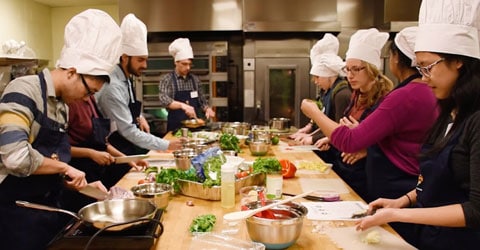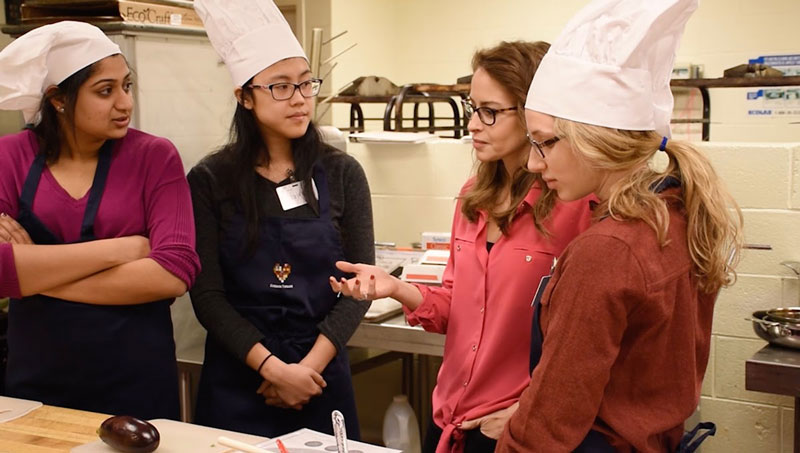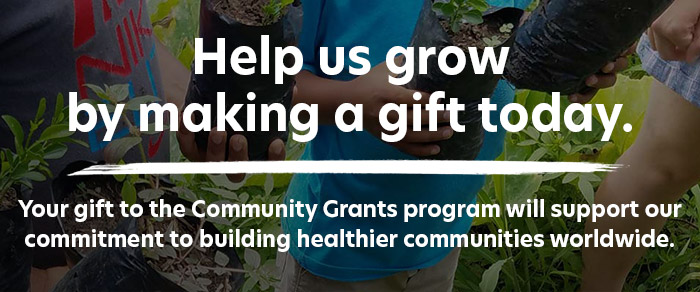

The following is an article from a Community Grant recipient.
Our culinary medicine program, Cooking Up Health (CUH)—an elective offered by the Osher Center for Integrative Medicine at Northwestern University—educates medical students on diet, lifestyle, and nutrition; how they relate to disease; and how they can play a powerful role in medical practice. The course includes lectures, practice in motivational interviewing to promote healthy behaviors, hands-on chef-led culinary sessions preparing plant-based meals, and a service component by which students work with children from at-risk communities. The program was featured in Cooking for Life, a short documentary by the Take Care Campaign that follows the stories of a working mother, her daughter, and a medical student as they transform their understanding of healthy food.
The CUH course was developed to address two challenges: 1) the tremendous cost (both in quality of life and economic impact) of noncommunicable lifestyle-related diseases, and 2) the lack of education on those lifestyle choices.
The obesity epidemic is an example of the first challenge, and it is one of our most critical and challenging public issues, as obesity has been predicted to lead to a decline in life expectancy in the US. The figures suggest that urgent action is required. For example, a 2013 analysis of childhood obesity in Chicago revealed that 43.3% of public school students were overweight or obese. But this problem also presents a tremendous opportunity to improve public health. Lifestyle changes can prevent an estimated 90% of cardiovascular disease and diabetes, and 70% of all cancers.

This brings us to the second challenge—that despite the huge potential role of lifestyle, physicians on the frontline are ill-prepared to advise patients on nutrition. Only 29% of medical schools teach the recommended 25 hours of nutrition, and fewer than 14% of practicing physicians feel adequately trained. Physicians are, in other words, being denied access to one of the most powerful tools for treating their patients: training in the importance of nutrition and lifestyle.
That’s where CUH comes in. Launched in 2017 and developed jointly by faculty at the Osher Center and Common Threads, a nonprofit organization that provides cooking and nutrition education to underserved neighborhoods, CUH began after we evaluated the work of other culinary medicine programs that combine nutrition and culinary education. There are at least ten such independent culinary medicine programs that include instruction for medical students, and they are proven to increase medical students’ nutrition knowledge, healthy behaviors, and self-confidence in counseling patients. But when we reviewed the available options, we realized that we needed to create a brand new program that emphasized the profound benefits of plant-forward diets.
The emphasis on plant-based or plant-forward diets in the lectures, articles, and recipes distinguishes the CUH curriculum. This focus was chosen for several reasons: an increasing preponderance of data supporting the benefit of plant-based diets in significantly reducing the incidence of, or risk factors for, cardiovascular disease, type 2 diabetes and obesity; the medical faculty’s personal preference for this diet based on these health benefits and taste; and student feedback suggesting that those who already followed plant-based diets would be uncomfortable preparing animal-based foods.
Medical students from all classes since CUH’s inception have reported that they enjoy the course and plan to continue to incorporate what they learned into their future work with patients. They noted significant increases in their comfort and confidence in nutrition and obesity counseling, and increased appreciation for the importance of nutrition counseling in patient care. In addition, the course had a positive impact on their own dietary lifestyles: participation in the course was associated with decreased daily meat consumption and increased fruit and vegetable consumption over the course of the elective.
“It has motivated me more to consider how diet can work with medicine and decrease the need for medication while improving outcomes.”
Asked whether the course helped them, and how, students reported:
- “It introduced me to new foods (especially new grains) that I hadn’t considered incorporating into my diet, and I have been eating more fruits, vegetables, and non-meat proteins as a result of the course.”
- “In addition to providing more information about nutrition and counseling it helped to improve both my cooking skills and the nutritional quality of the food I cook.”
- “It has made me be more mindful of what I am eating and I feel a lot better every day.”
Asked whether the program changed their attitudes toward medicine and healthcare:
- “It has motivated me more to consider how diet can work with medicine and decrease the need for medication while improving outcomes.”
- “It has reinforced my opinion that diet counseling is important and should be included in physician visits.”
- “Regardless of the medical path that I choose, I know that I will use this knowledge to improve the lives of my patients.”
And asked how they see themselves integrating the skills from class into their work with patients:
- “I can definitely counsel patients better on diet and exercise in my medical home clinic and the free clinics where most patients have hypertension, diabetes, etc.”
- “Especially coming from a lack of culinary skill and knowledge, I can emphasize the skills to improve and how to do so in a manner that is personalized for each of my patients.”
These testimonials reflect only a small sample of what CUH offers, and can offer with continued growth. Our goal this year, supported in part by the CNS Community Microgrant, is to adapt the curriculum to meet the unique needs of resident physicians. These trainees are on the front line of care, but often neglect self-care due to the rigorous demands of residency training. Our goal is to pilot the learning curriculum with the Northwestern family residency. We also aim to explore options for this service to help children from disadvantaged communities and food deserts.
We believe expanding this curriculum to residents could have an exponential impact on factors related to obesity, access to care and nutrition in the region. Not only does each trainee interact with children during the course, but throughout their training and career each will touch the lives of thousands of patients. If the pilot is successful, we anticipate scaling up the Cooking Up Health curriculum so that it can be provided across the Chicagoland area, and ultimately nationally.

The T. Colin Campbell Center for Nutrition Studies (CNS) is committed to increasing awareness of the extraordinary impact that food has on the health of our bodies, our communities, and our planet. In support of this commitment, CNS has created a Community Grant initiative to empower sustainable food-based initiatives around the world by providing grants to enable innovative start-ups and to propel the growth of existing initiatives. Please consider making a donation to this great cause. 100% of your donation will go to support initiatives like the one you just read about in this article.
Learn more about our Community Grant program.
References
- Olshansky SJ. Projecting the future of U.S. health and longevity. Health Aff . 2005;24 Suppl 2:W5R86-R89.
- Chicago C of. Overweight and Obesity among Chicago Public Schools Students, 2010-11. https://www.cityofchicago.org/content/dam/city/depts/cdph/CDPH/OverweightObesityReportFeb272013.pdf
- Willett WC. Balancing life-style and genomics research for disease prevention. Science. 2002;296(5568):695-698.
- Adams KM, Butsch WS, Kohlmeier M. The State of Nutrition Education at US Medical Schools. Journal of Biomedical Education. 2015;2015. doi:10.1155/2015/357627
- Vetter ML, Herring SJ, Sood M, Shah NR, Kalet AL. What do resident physicians know about nutrition? An evaluation of attitudes, self-perceived proficiency and knowledge. J Am Coll Nutr. 2008;27(2):287-298.
- Ring M, Cheung E, Mahadevan R. Folkens S, Edens N. Cooking Up Health: A Novel Culinary Medicine and Service Learning Elective for Health Professional Students Journal of Alternative and Complementary Medicine. Published in Volume: 25 Issue 1: Jan 18, 2019.
Copyright 2026 Center for Nutrition Studies. All rights reserved.
Deepen Your Knowledge With Our
Plant-Based Nutrition
Certificate
Plant-Based Nutrition Certificate
- 23,000+ students
- 100% online, learn at your own pace
- No prerequisites
- Continuing education credits






